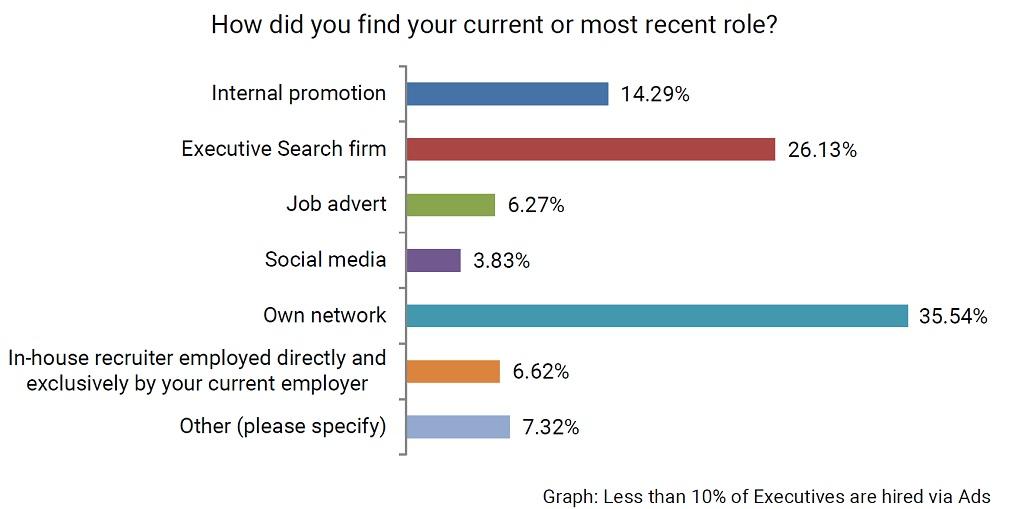“The Hidden Executive Job Market.” “On The Radar.” “Not Actively Looking.”
All phrases associated with an executive-level job search, all phrases that are not associated with more junior hiring.
Though, it’s not just in terms of vocabulary that senior-level retained executive search and other types of recruitment are different. When aiming to fill leadership roles, recruiters would go out and ‘headhunt’ the best executives – be that person an active job seeker or not – rather than trawling through job boards.
Historically this used to be the case, however at GT, we have now introduced a groundbreaking way to deliver these opportunities directly to you through our new Job Board. With this platform, you can access exclusive top-tier positions, privately engage with leading Executive Recruiters in 100+ countries, and benefit from AI-driven interview advice tailored to every job listing.
Nonetheless, besides using our innovative Job Board platform, you may wonder about other means through which you can be discovered for senior executive roles.
So, the big question is, how to be found for senior executive jobs?
The hidden executive jobs market
At the time of writing, the global bank HSBC is looking for a new Chief Executive. Cathay Pacific is also searching for a new CEO. As is the soccer franchise, “The Premier League.” Likewise, Mozilla. The likelihood is that you won’t find any of these positions listed on job sites.
If you are looking for a job in healthcare, it’s easy to find healthcare job boards. Financial services jobs? The same applies. Sales jobs? There is any number of specialist or generic job boards that will frequently send you relevant job alerts.
However, executive job boards are far less frequently found, and typically have far less genuinely executive-level career opportunities listed.
You may find management openings listed, but it’s hard to find C-suite and other senior-level jobs. That’s because most of these executive opportunities are rarely advertised. Indeed, the majority of executive recruiters actively avoid publicizing the opportunities that they are working on. Recent research suggests that 51% of executive searches are executed confidentially. The percentage of executive management roles advertised in the corporate sector is likely to be even higher. We are talking about the “hidden jobs market.”
So how can executives navigate this hidden jobs market? Is there a best way to find executive-level jobs in this scenario?

Why are executive career opportunities rarely advertised?
Search firms would argue that discretion benefits the client organization in several ways. First and foremost, some searches are designed to replace an existing C-level employee. For this information to leak could be hugely impactful. In a public company context, the very existence of a search might be considered to be “price-sensitive,” and so there may even be legal ramifications. More generally, the departure and replacement of a senior executive need to be handled in a way that minimizes the potential downside to the employer.

Ads are seldom the best way to source an executive
Privacy benefits potential candidates
A specific C-suite executive search from the perspective of the client might well take 90 days on average. During much of this time, several candidates will be under consideration. Most of these executives will not be successful and will have to continue with their current employer. Clearly, it is not in the interest of these individuals that speculation about an opportunity references them.
Executive job boards
When an executive search firm is retained to fill a senior-level position, the end client is expecting them to go out and find the best candidate for the job.
Recruiters group candidates into two types – “Active” and “Passive”. An active candidate is one who is actively involved in a job search. He or she will be taking pro-active steps to find a new role – including potentially applying for positions via executive job boards. However, “passive” candidates are those who are not actively looking for jobs or seeking new opportunities. By definition, these executives are not going to be found on job boards.
The executive search firm has to define a strategy that will identify all candidates in the market. This is achieved via research – the recruiter aims to identify candidates with appropriate skills and experiences and will approach them, rather than the other way around. This approach will identify both active and passive candidates. As a result, there is no apparent reason to advertise the opportunity.
So how to find executive roles?
If the executive can’t go to the recruiter then she needs to do everything she can to get the recruiter to come to her. She needs to ensure that she is visible to executive recruiters. At the same time, she should ensure that she is not “seen to be looking” by current colleagues. By increasing visibility, she will increase her prospects of being identified for important senior executive level jobs. Achieving this is known as “getting on the radar.”
I’ve blogged before about the process that executive recruiters go through to identify candidates. What about from the perspective of the executive herself? How can an executive increase the chances of a headhunter calling?
Offline visibility
Executive search has been around for far longer than the Internet. While executive recruiters spend vast amounts of time using services like LinkedIn and GatedTalent, the fact is that much of the pre-internet advice still holds good.
Headhunters often seek recommendations. This process is called “sourcing” and involves taking advice and recommendations (on a confidential basis, obviously!). As a result, traditional offline networking and building professional relationships still matters. Gaining a reputation for being good at what you do – speaking at conferences, writing for trade press – this will all help your name to come up more often. No article entitled “how do executives find jobs” would be complete without referencing the importance of offline networking.
Online visibility
Generally speaking, any particular executive search assignment will be handled by a single executive search firm. Clearly, with opportunities being confidential, the executive has no way of knowing which search firm will be responsible for which appointment. As a result, a strategy that increases visibility to all recruiters is likely to be more successful than one that targets specific firms. Online visibility is the easiest way to achieve this.
Find your niche, whether it is writing on a specific topic within your industry, attending relevant conferences or speaking at industry events. Share your expertise to expand your online visibility. Your executive job search will be advanced by your online presence. Don’t limit your network to executives within your industry. There is immense value in cross-industry experience so build contacts where you can. Making your presence felt online is the easiest route to establishing contact and being visible to the right people.
Deciding what you want
There are more than 500 million profiles on LinkedIn. That’s a considerable amount of competition. And, in reality, there is no way that an executive will be considered for every possible search.
As a result, the first stage of being found is to accept this.
Then take the decision to move from a generic LinkedIn profile to one focussed on being found for relevant positions. This process is known as LinkedIn Profile Optimization.
Getting found on LinkedIn – LinkedIn Profile Optimization
There is an entire industry devoted to helping executives increase visibility on LinkedIn. We provide support with this service to our GatedTalent members, and you’ll find a detailed explanation of how to optimize your LinkedIn profile elsewhere on our site.
I’d encourage you to have a read of that. In short, however, LinkedIn profile optimization involves identifying the “keywords” associated with the types of role that you wish to be considered for.
Those keywords are then placed in strategic places across your profile – your tagline, your summary, and your employment history. It involves adding appropriate skills, joining appropriate groups, and taking steps designed to make LinkedIn believe that you are what you say you are.
An investment in an optimized LinkedIn profile from a qualified writer will cost from $400 and is well worth considering for those executives looking to raise their profile on the “world’s largest professional network.”

Next steps for an executive job search:
In conclusion – executive job boards rarely list top-level executive appointments. As executives become increasingly senior, they are increasingly dependent on being spotted by executive recruiters. The more senior the executive, the fewer potential opportunities for development. And so the answer to the question “how to find executive jobs?” is “help recruiters find you.”
As a result, an executive must follow a proactive career strategy, including all of the following steps:
- Decide on the type of position you wish to be considered for
- Work out the skills and experiences that such a role might require
- Optimize your LinkedIn profile to ensure that you come up for appropriate searches
- Join our complimentary “Executive Careers” webinars to understand better the motivations of executive recruiters and what to expect when you are approached – you can register here.
Other resources for the executive job seeker:
Career advice from executive recruiters: How to manage your executive career strategy – advice direct from the recruiters!
What are retained executive search firms? Understand how senior-level executive search firms operate.
Executive interview questions and answers – Real examples from executive recruiters of the questions you might expect as you go through the search process
Executive Interview Preparations – Whether it is an urgent need to prepare for your upcoming interview or a more bespoke interview program, find your confidence for success with some expert executive coaching.
Recent research into academic executive search, for example, suggests that 51% of executive searches are executed confidentially
Join GatedTalent Now!
Thank you
We have sent a verification link to your email. Please follow the instructions to activate your account.













